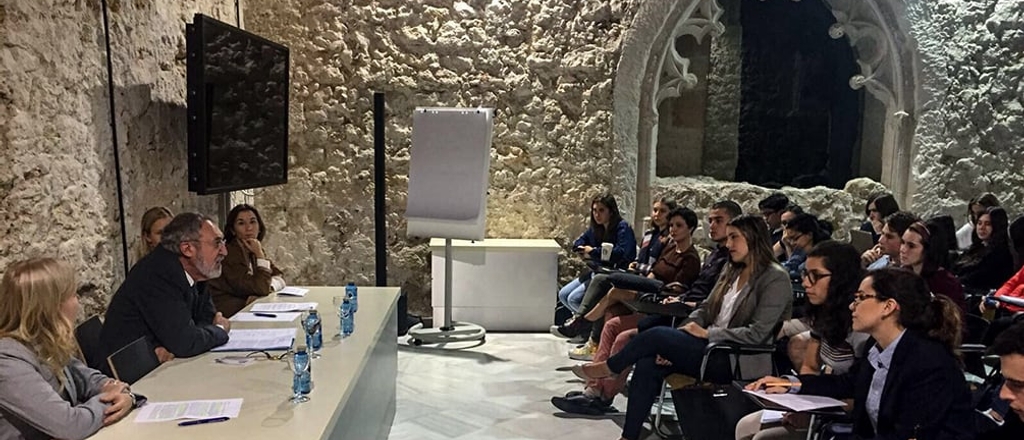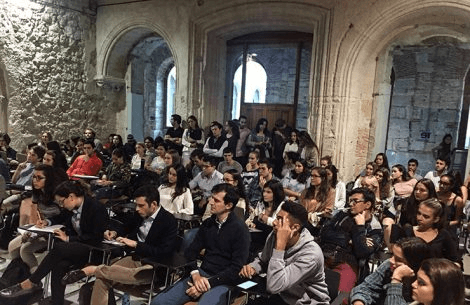- Home
- We Are Law School
- News
- Judge Luis López Guerra From The European Court Of Human Rights Visited Ie
Judge Luis López Guerra from the European Court of Human Rights visited IE

The European Court of Human Rights is an international court set up in 1959. It rules on individual or State applications alleging violations of the civil and political rights set out in the European Convention on Human Rights, signed in 1950 in Rome. The Convention is an international treaty under which the member States of the Council of Europe promise to secure fundamental civil and political rights, not only to their own citizens but also to everyone within their jurisdiction. The Court is based in Strasbourg, France, where the headquarters of the Council of Europe are also located.
There is no question that the refugee phenomenon is one of truly global proportions, affecting not only millions of marginalized people directly, but also the policies and practices of most governments in the world.
The European Convention of Human Rights is a leading human rights treaty. It has played a significant role in protecting the rights of migrants and refugees especially in situations where their return to their home country would subject them to torture or to inhuman or degrading treatment or punishment. Judge López Guerra went through some of the key case law of the Court in this regard. He was careful to underline that the Court cannot interfere in political decisions of the member countries but applies the Convention to individual cases by examining complaints (known as “applications”) lodged by individuals or, sometimes, by States.
Judge López Guerra also told the students about his experience, first, as a clerk (1982-1986), and then, as a Judge of the Constitutional Court of Spain (1986-1995). His visit was highly appreciated by a full room of IE students studying the Bachelor in Politics, Law and Economics, the Bachelor of Laws and other IEU students interested in the subject.
"Meeting with the Honourable Judge was a vital opportunity in order to understand the global migration crisis. We could apply our theoretical knowledge to Mr. Luis Lopez Guerra’s interesting examples of the trials from the European Human Rights Court. This conference helped us, to once again, augment our conceptual background in European legal framework and judicial mechanisms, which migrants all over the world are using. After the lecture, Honourable Judge answered a few questions regarding examples of migration movements, durable solutions for the crisis, and important theoretical concepts”, commented Georgy Aroniya, a student of the Bachelor in Law, Politics and Economics.
Another student of the Bachelor in Politics, Law and Economics, John Lebo, said that the conference was very interesting. "My fellow classmates and I learned that the actions necessary to protect refugees and to solve the migrant crisis are not much different from any other problems Europe faced. The European Court of Human Rights functions as a back-up method for protecting individuals. The States shoulder most of the responsibility and have the power to work together in order to comprehensively solve the issues they face as a European Union”, said John Lebo.
This event is part of the “Social Analysis Unplugged”, a course structured in seminars on a specific topic (which this year is forced migrations due to its enormous importance in today’s society). These seminars offer students an adequate understanding of the complexities of forced migration by combining a political, economic, social, cultural and legal approach, thus, integrating the three disciplines of the program. In this context, students are provided with the analytical tools to address the complexities of forced migration and develop a rigorous assessment of its drivers and implications in the framework of international law.
“I found the talk extremely interesting and relevant on a personal level. Forced migration is of capital importance for today’s interdependent societies and needs a truly global response. As of today, there are more than twenty-five million refugees in need of assistance around the world, which is without a doubt worthy of analysis. From what Mr. López Guerra explained, I got to the conclusion that there is still a long road ahead of us”, said Elena Yustres, student of the Politics, Law and Economics Bachelor program, who believes we all have the moral obligation to be aware of the current situation of the refugee crisis since it affects us all. “The more conscious people are about the issue, the faster and the more efficient institutions will be at achieving a solution”, she concludes.
